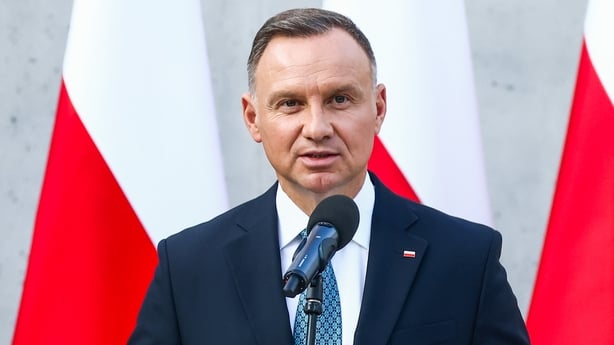Seven weeks on from Poland's general election, the country's centre-left opposition bloc is still waiting for its chance to form a government.
Although the bloc holds a majority of seats in parliament, Polish President Andrzej Duda handed the nationalist-populist Law and Justice party, which has ruled Poland since 2015, the opportunity to form a new government first.
Mr Duda said it was a tradition to appoint a government formed by a candidate from the party that won the largest number of seats.
"It's absolutely clear that this is a make-believe situation," Adam Jasser, a former head of policy for a previous Donald Tusk government, told RTÉ News.
Mr Jasser made the point that former Polish presidents Aleksander Kwasniewski and Lech Kaczynski, as well as Mr Duda during his first term, appointed prime ministers that represented a parliamentary majority.
Two days after the election, Mr Tusk and the leaders of three other opposition parties held a press conference and declared that they would work together in government. That was followed by a signed agreement between the parties which outlined their jointly agreed policies.
However, this week, Mr Duda swore in Mateusz Morawiecki as prime minister, along with members of his new Law and Justice cabinet. Many in Poland have questioned the point of a government that is only likely to last two weeks.

"It's a bit of a joke. I don't buy into the argument that Law and Justice has been putting round, that they wanted to show what an amazing government they could have been," Andrzej Bobinski, editor-in-chief of Polityka Insight, said.
Law and Justice won 194 seats - 37 seats short of a majority. The centre-left coalition, led by Mr Tusk, won 248 seats in the 15 October election.
Even the far-right Confederation party, which won 18 seats, will not support Law and Justice.
The temporary cabinet that was sworn in this week is stacked with technocrats, many of whom have not held ministerial roles before.
Jaroslaw Kaczynski, the leader of Law and Justice, said the make-up of the new cabinet was his idea.
"We want to show that it is possible to govern differently," Mr Kaczynski told the Polish Press Agency.
A confidence vote on Mr Morawiecki's premiership will be held on 11 December, and will almost certainly be defeated by a large majority.
Still, that approaching deadline of 11 December has not stopped Law and Justice from trying to improve its standing before it finally becomes a party of opposition.
For instance, last week, Mr Morawiecki appointed Jacek Jastrzebski to a second term as head of the Polish Financial Supervisory Authority.
It is a five-year term and cannot be reversed by another incoming government.
Mr Jastrzebski, previously appointed to the role by Mr Morawiecki in 2018, will have the power to appoint the presidents of Poland's largest banks and the Warsaw stock exchange.
In parliament and on social platform X this week, Mr Morawiecki continued to act as if his party was still fighting the election campaign, declaring that Law and Justice "works for Poles".

Since the vote in mid-October, the party has declared that it was the winner of the election, by virtue of the fact that the party won the largest number of seats of any party. Yet, its share of the national vote was 35% and it lacks coalition parties.
One of the most controversial moves by the previous Law and Justice government in the lead-up to October's general election was its decision to establish a committee to investigate so-called Russian interference in Poland's internal security, from 2007 to 2022.
The opposition said that the committee could be used to unfairly target its leadership, some of whom were in government in the years prior to Russia's annexation of Crimea in 2014, a time when the West was still on talking terms with the Kremlin.
On Wednesday, the committee, whose members were all appointed by Law and Justice, recommended that Mr Tusk and other senior opposition politicians be barred from holding public office because of their dealings with Russia more than a decade ago.
State broadcaster TVP, which has acted as a biased mouthpiece for Law and Justice since 2015, gave the committee's announcement prominent coverage.
Writing in Visegrad Insight, a political publication, Mr Jasser said that the committee’s recommendation carries "no legal weight" and had been conducted without any public hearings.
The committee was duly dismissed in a scheduled parliamentary vote that same evening, underscoring the coalition's majority in parliament and Law and Justice's weakened position.
Tensions between the two camps ramped up in parliament this week too.
The coalition parties proposed the formation of three committees to investigate alleged wrongdoing during the Law and Justice government years.
One such committee will investigate whether Pegasus, an Israeli-made spyware technology, was employed by the Law and Justice government to hack the phones of political opponents.
Law and Justice denies any accusations of wrongdoing.

In an unexpected U-turn, Mr Morawiecki backed the centre-left opposition's bill to reinstate state-funding for IVF treatment, which passed by majority.
Law and Justice cut IVF funding when it came to power in 2015 and most of its MPs voted against the proposal this week.
In the event that Mr Morawiecki loses the vote of confidence on 11 December, Mr Tusk will be nominated as prime minister by the coalition parties the following day, and would then be appointed prime minister on 13 December.
If that timeline holds true, Mr Tusk will join other EU leaders at the EU Council summit on 14 December.
As prime minister, he will seek to unblock €75bn in EU cohesion and recovery funds, frozen due to European Commission concerns over rule-of-law changes during the Law and Justice years, namely a reduction in the judiciary's independence.
Mr Duda's loyalty to Law and Justice since the 15 October election suggests that relations between his office and the new centrist government will be testy. As president he can veto legislation passed by parliament, though he cannot block the budget.
Marcin Zaborowski, a political analyst and policy director at think tank Globesec, told RTÉ News that he believes Mr Duda will adopt a more "partisan approach" to dealing with a new government led by Mr Tusk.
Common ground may be found between the president and the new centre-left government on matters of defence and security, but they are likely to strongly disagree on the direction of foreign policy.
Relations between Mr Duda and the incoming government, said Mr Bobinski, are likely to "get worse with every week and month".
An IBRiS poll published this week found that Mr Duda has a popularity rating of 32.5%, with Law and Justice voters holding more positive views of the president.







